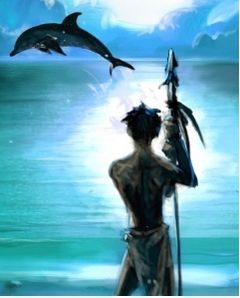Mau
| The New Man | |
 | |
| Name | Mau |
| Race | Human |
| Age | 13 |
| Occupation | Father of his country |
| Physical appearance | |
| Residence | Nation |
| Death | Much later |
| Parents | |
| Relatives | |
| Children | |
| Marital Status | Alone |
| Appearances | |
| Books | Nation |
| Cameos | |
The Ritual of Passage
Mau is the main character in the non-Discworld novel Nation. He is a young man of about thirteen. At the start of Nation, Mau is returning to his home island from the "Boys' Island", where boys are taken and left by themselves in order to become men (a rite of passage).
In Mau's case, however, a volcano erupts on his way back home for his feast to celebrate his becoming a man (officially). Although the volcano seems distant, the resulting tidal wave washes over the Nation (the name of Mau's island), killing all the villagers. Mau, in a canoe on the sea, survives with only a head injury. After the disaster, Mau is forced to fend for himself, and begins to question the beliefs of himself and his people.
The Real Rite of Passage
When Mau returns to Nation, there is not a soul left. At the time when the wave came, every single person on the island would have been gathered on the beach to welcome home the new man returning from Boy's Island. Him. So much that he had known was destroyed, and grey corpses lie in the grey mud. He dies, or something in him dies. In the grey realm of the dead, it is another Mau who does what has to be done, and sends the dead ones into the deep ocean current the way it has always been done, man, woman and child, dog and piglet. He works until it is all done. He is about to send himself into the current then, but his body tells him, "Not this one. You are not dead."
The first thing that restores colour to his world is some fruit left for him on the beach, the gift of the ghost girl (Daphne), whose presence he has not really believed in till then. When he goes to find her in the wreckage of the Sweet Judy, communication is achieved only gradually, starting with the recognition of feelings in the other rather than by words. They come from such different worlds. A relationship of deep trust grows up between them. He says she saved his life twice, and it goes far beyond that.
Mau cannot restore Nation to what it was, as the voices of the Grandfathers demand. Another kind of order is established as he rediscovers what is left behind, such as the Women's Place, which he would never have entered in the ordinary way, and Daphne, and the wreck of the Sweet Judy, and as refugees arrive from the wreck of other islands. If he and others are to survive, Mau has to look at and see what is actually there. To solve the problem of providing milk for a baby, he finds a way of milking a wild sow. Later he will face conundrums such as how to cope with a psychopathic English pirate, or even the British Empire. He chooses from what he sees to be true.
Changes
What Mau cannot see to be true is that his first responsibility is to restore the religious practices that he would have taken up but for the wave. To say to him, as the old man Ataba does, that he should be grateful to the gods that he has been spared, not only makes no sense to him, but brings his anger to white heat. He does not know whether the gods never existed, or whether they betrayed the trusting people of the island. He is willing to restore the God-stones for the sake of the battered people who want to rebuild their lives, but in the event, this provokes a crisis which is the opening of a new way of being for Nation. The world is turned over.
Daphne will say of him to a head-hunting Raider, "The wave took away his soul, and he made himself a new one... He made it outside himself. You are standing on it. It covers the whole island, every leaf and pebble."
He becomes a choosing person. "Does not happen" is what he shouts at the sky and at Death after he saved Daphne from drowning, and stands guard over her with his spear until morning. On three occasions, when he put his life on the line to save another, Locaha (Death) spoke to him. The third time, Locaha showed him the glittering pathway to "Imo's perfect world", a place for those who "have striven, who have become more than the mud from which they are made." But he chose to come back, saying he thought that if Imo wanted a perfect world, he wanted it here. The conversation does not end there.
In an interview Terry Pratchett said, "I began with the initial image of a boy standing on the shore, screaming at the gods." In another interview: Mau says as an old man, “The creator gave us the brains to prove he doesn't exist. It is better to build a seismograph than to worship the volcano.”
But Mau is not a materialist. Near the end of the book Daphne asks him, "Would you go back? If you could?" meaning, "Would you wish that the wave had never happened?" and he gives a good answer.